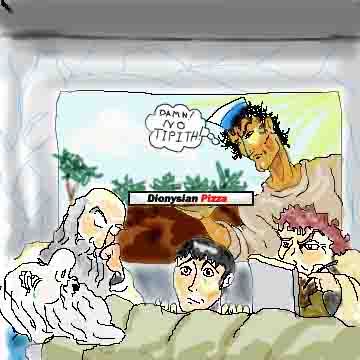Plotinus’ Last Words:
His one-time student Eustochius, who was also a doctor, reportedly arrived at Plotinus’ death bed just in time to hear his last words – as related by Porphyry in his Vita Plotinus. There has been much debate as to the meaning of these words, largely due to some variations in manuscripts, but also due the inability to decipher completely any one meaning. G.W. Most recently has argued that the key to the last words, is actually found in Plotinus’ penultimate words: “Still I’m waiting for you.†[sè éti periménō]
The variations of Plotinus’ final statement, in which it is hoped he expressed the core of his philosophy, are translated by G.W. Most as follows:
…and he then said, “Still I’m waiting for youâ€, and having said that he was trying to restore the divine in us back up to the divine in the All…he sent up his soul.
and,
…and he then said, “Still I’m waiting for youâ€, and having told him, "[personally] Try to restore the divine in us back up to the divine in the All"……he sent up his soul.
and,
…and he then said, “Still I’m waiting for youâ€, and having said, “You try [second person plural] to restore the divine in us back up to the divine in the All"……he sent up his soul.
What may seem an academics’ quibbling over emendations and transmission, actually seems to be resolvable by leaving, or recognizing, the ambiguity within the text itself – without emendations towards clarity. What G.W. Most draws our attention to is the curious nature of Plotinus’ penultimate words, a fact that some translators have simply translated away, ignoring the odd construction. Eustochius has come seventy kilometers only to arrive nearly too late; and as he enters, Plotinus tells him not, “Finally you have arrivedâ€, or even “I have been waiting for youâ€, but rather, “Still I am waiting for you.†What follows need neither be decided to be: an injunction to Eustochius, or other pupils, to continue his work, nor a declaration of the nature of the work itself that Plotinus has been and at even at death is conducting. The penultimate words, “Still I am waiting for you,†said in the presence of the newly arrived Eustochius subsume both meanings. Plotinus’ philosophizing can be seen as the very act of such waiting, from the synchronic position of the “Allâ€. It is a gnomically nested: I am (and have been) trying to ‘return the divine in us back to the divine in the All’, and in so doing I am (and have been) waiting for you ‘to try to return the divine in us back up to the divine in the All’.
What is interesting in this is the religio-political theoretical consequence that leaves no man/woman behind, implicit within the field of the rational itself. While utopian Idealism is often painted as a Top Down imposition of meaning, here it is expressed immanently, unfolding within discourse itself. As Plotinus dies he signals both the nature of what he has-done/is-doing, and the imperative that such doing exacts upon those who have studied him. What it reads as is,
“Still I am waiting for you,†and having declared, “trying (infinitive) to lead-up (anagein) the divine in us back to the divine in the Allâ€â€¦he sent up his soul.
What this seems to reflect is a Spinoza-like subsumption of the entirety within the domain and project of philosophical illumination. The (I)/(you) distinction that is making the “attempt”, which is ambiguous in the text, is actually a boundary-dissolution implied in Plotinus’ philosophy of the “Allâ€. And it is, synchronically, from the end-of-time that he seems to speak.
This point is further emphasized, or perhaps clarified, by the words with which the Neo-Platonist Synesius ends a letter of his, thinking of Plotinus’ final breath nearly a century later,
“…philosophize, that is restore (ánage) the divine in you back up to the first-born divine.â€
To what extent when one philosophizes, in any regard, is one “still waiting for†others, by the very virtue of the coherence of one’s speech and thought? Is there not a synchronic space that is opened up even in the most differential of discourses, the “chora†in which it is to be delivered? Such a space (or ends) is the presumption of an imperative that seems to ground the very act of speech and writing from Plato onwards.
Dunamis
